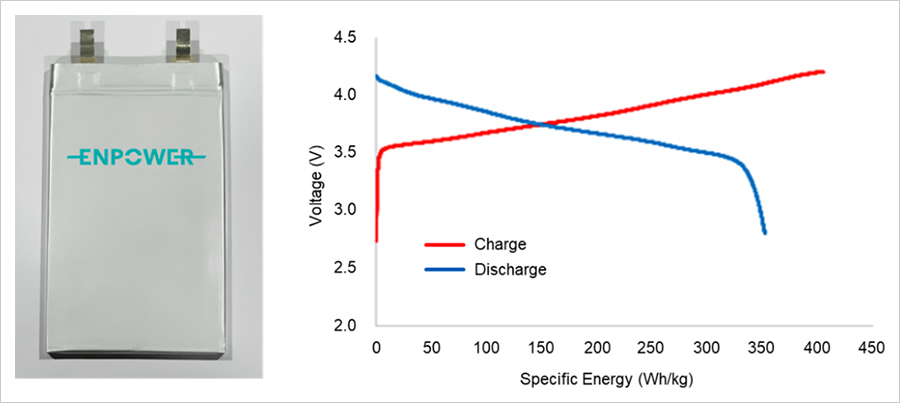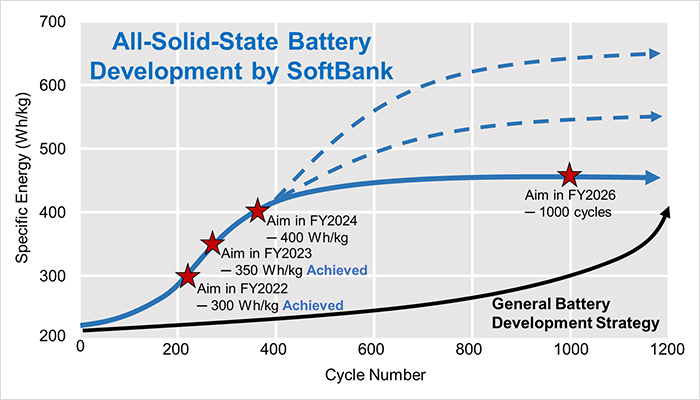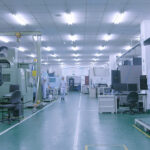ASIA ELECTRONICS INDUSTRYYOUR WINDOW TO SMART MANUFACTURING
Softbank, Enpower Hurdle Energy Rate in New Battery
SoftBank Corp. and Enpower Japan Corp. succeeded in developing all-solid-state battery technology with higher energy density. Primarily, it includes increasing the active material ratio by homogenizing the solid electrolyte and thinning the solid electrolyte layer. Additionally, they successfully verified a specific energy of 350Wh/kg in an all-solid-state battery cell with lithium metal anode.
Research of Next-Gen Batteries
SoftBank and Enpower Japan have been conducting research and development of next-generation batteries with high specific energy (Wh/kg). The batteries are lightweight and have large capacity for use in High Altitude Platform Stations (HAPS), which provide telecommunication services from the stratosphere. So far, the two companies successfully verified a liquid-type lithium metal battery cell with specific energy of 52 Wh/kg*1. Then, they achieved a specific energy of 300Wh/kg in the all-solid-state battery*2.
Both companies aim to achieve a specific energy of 400Wh/kg for HAPS batteries during FY 2024 ending March 31, 2025. Eventually, they target to achieve a battery life of more than 1000 cycles during the 2026 fiscal year.

Aim for 300Wh/kg All-Solid-State Battery
Previously, SoftBank and Enpower Japan succeeded in the development and verification of all-solid-state batteries with specific energy of 300Wh/kg. Specifically, they reduced the interface resistance between the cathode and solid electrolyte layer. As a result, it lowered the weight ratio of the solid electrolyte in the cathode mixture and the thickness of the solid electrolyte layer.
This time, to further increase specific energy, development has been focused on improvement of the homogeneity of the materials. This aims to reduce interface resistance.
Mainly, solid electrolyte, unlike liquid electrolyte, shows low adhesion on the interface of the cathode active material and solid electrolyte. This increases the interface resistance related to ion conductivity, which causes reduction of battery capacity, decrease in output characteristics and cycle life characteristics. Also, it leads to difficulties in interface formation between the cathode active material and solid electrolyte, and solid electrolytes themselves.
To solve these issues, SoftBank and Enpower Japan succeeded in the homogenization of the solid electrolyte. Particularly, they controlled the particle size of the solid electrolyte by adjustment of the particle size in the raw materials and improvement of the grinding process, as well as improved the dispersion of particles in the film formation process.
Primarily, this approach improved the dispersion of the conductive material, increasing the utilization rate of the cathode active material. Also, it improved the smoothness of the electrode layer to form a good interface between the electrodes, which realized a high capacity over a large area and suppressed short circuits. As a result, the companies succeeded in increasing the specific energy of the all-solid-state battery cell with lithium metal anode to 350Wh/kg.
Circle Life Characteristics
Regarding circle life characteristics, SoftBank and Enpower Japan have achieved 200 cycles at the electrode level. However, the short circuit occurring during cycles remains an issue in large-area pouch cells. Both companies will continue to develop further homogenization technology for materials and electrodes to make it possible to prevent a short circuit for the large-area electrodes or the stacked structure.

In Pursuit of Higher-Capacity Batteries
SoftBank and Enpower Japan will continue research and development to increase the capacity of next-generation batteries. Particularly, they aim to achieve specific energy of 400Wh/kg in 2024 fiscal year, and then, in 2026 fiscal year, increase the battery life to more than 1000 cycles.
Also, they will develop core technologies to reduce pressure in compression mechanism. This will contribute to further improvement of the solid-state battery performance and promote the batteries’ practical use, while also promoting their use in the aviation field, including HAPS and drones, as well as in IoT devices and automotive applications. Thereby, it will contribute to solve current social issues in a multi-faceted way using next-generation batteries.
Notes:
*1 Please refer to the press release dated November 21, 2021: “SoftBank Makes Great Progress in the Next-generation Battery Development, Successfully Verifying Three New Technologies Including Development of Cathode Materials for Solid-state Batteries” (in Japanese)
*2 Please refer to the press release dated August 24, 2023: “SoftBank Corp. and Enpower Japan Corp. Successfully Developed All-Solid-State Batteries with High Energy Density. Batteries achieving specific energy of 300 Wh/kg”
-03 July 2024-




